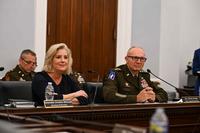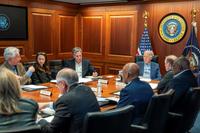A U.S. Senate panel has approved a measure allowing President Barack Obama to order a military strike against Syria in response to an alleged chemical weapons attack on civilians.
The Senate Foreign Relations Committee on Wednesday voted 10-7 in favor of a resolution authorizing the use of military force against the regime of Syrian President Bashar al-Assad after U.S. intelligence determined government forces there killed at least 1,429 people, including at least 426 children, in an Aug. 21 sarin gas attack in the suburbs of Damascus.
"We have developed language that we believe appropriately narrows the scope, duration and breadth of the authority granted to meet congressional concerns and the concerns of the American people," Sen. Robert Menendez, D-N.J., the committee's chairman, said before the vote. "This is a tightly tailored, or specified, authorization."
The measure would set a 60-day deadline for military action, with an optional a 30-day extension, and bar the deployment of ground troops to the country, or "boots on the ground." The resolution, which included several amendments, must still be approved by the full Senate and the House of Representatives.
Two Democrats and five Republicans voted against the resolution: Tom Udall, D-N.M.; Chris Murphy, D-Conn.; James Risch, R-Idaho; Marco Rubio, R-Fla.; Ron Johnson, R-Wis.; John Barrasso, R-Wyo.; and Rand Paul, R-Ky. Another Democrat, Edward Markey of Massachusetts, voted "present."
There is "no clear endgame" for a U.S. intervention in Syria, Udall said after the vote. He drew comparisons to the Vietnam and Iraq wars and said: "The American people are not with us."
Rubio said, "I remain unconvinced that the use of force proposed here will work."
Two Republicans, Bob Corker of Tennessee, the senior Republican on the panel, and John McCain of Arizona, joined with most Democrats in supporting the measure.
President Barack Obama and top administration officials in recent days have pressed lawmakers to support a limited U.S.-led airstrike to degrade the ability of the Syrian regime to launch further chemical weapons attacks, saying international treaties prohibit the use of weapons of mass destruction.
"I didn't set a red line," Obama said today during a press conference in Sweden. "The world set a red line." He was referring to a statement he made last year when he said Syria's use of chemical weapons "would change my calculus" for military action.
Only 36 percent of the American public supports launching missiles against the Syrian regime, according to an ABC News/Washington Post survey released Tuesday, with almost six in ten opposing such a move. A small percentage of respondents had no opinion.
The Navy is maneuvering warships in the region in the event Obama orders a strike.
The service is positioning four destroyers in the Mediterranean Sea. The Stout is underway in the Mediterranean, where the guided-missile destroyer is joining the destroyers Ramage, Barry and Gravely off the coast of Syria as part of the U.S. Sixth Fleet. It has also deployed the aircraft carrier Nimitz, with about 80 aircraft aboard, and its battle group to the Red Sea.
Defense Department officials haven't detailed how an air campaign would unfold, though experts have said it would probably involve launching a series of Tomahawk Land Attack Missiles, or TLAMs, from the ships against Syria's command and control facilities, air defenses and aircraft.
More than 100,000 people have died in the more than two-year-old uprising against forces loyal to Assad, according to a June estimate from the U.K.-based Syrian Observatory for Human Rights, which tracks the death toll through a network of activists in the country.

























